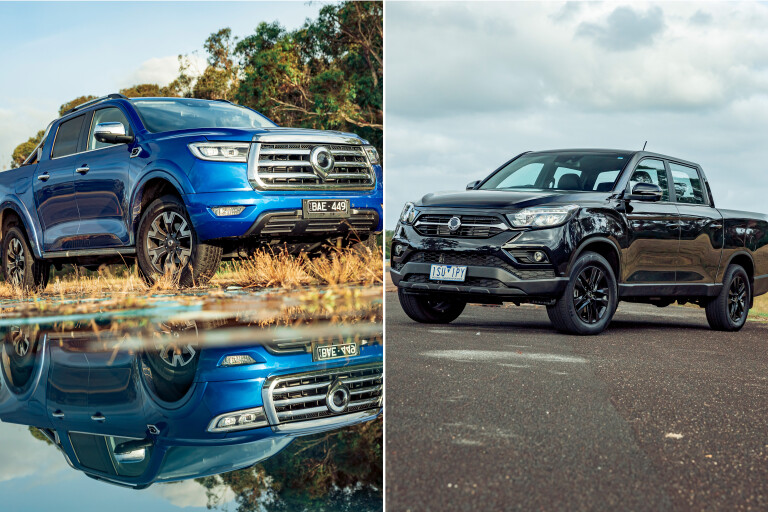
Gee whiz dual-cab utes are a bit expensive these days, aren’t they? But they don’t have to be. While there's no doubt we’d all love to have $70,000 or more to splash on a jacked-up trayback, those who have a more limited budget need no longer miss out thanks to these two, the GWM Ute Cannon-L and Ssangyong Musso XLV Ultimate.
You can drive away in either of these babies for around $40K including on-roads. The GWM, which stands for Great Wall Motors in case you were curious, costs $37,990 drive-away for the mid-spec Cannon-L variant we have here, while the Ssangyong, even in long-wheelbase XLV guise, lists at $41,790 driveaway, which currently includes three years of free servicing.
Don’t think these bargain basement prices mean you miss out on kit, though. Both are fully loaded, the Musso Ultimate offering powered, heated and ventilated front seats, HID headlights, a 360-degree camera, smartphone mirroring, front and rear park assist, autonomous emergency braking, lane departure warning, blind spot detection, lane change assist and rear cross-traffic alert.
Judges and writing team: Scott Newman, Byron Mathioudakis, Louis Cordony, Evan Spence, Tom Fraser
Photography: Ellen Dewar, Alastair Brook, Cristian Brunelli
Catch the full series here
- Premium utes: Ranger vs D-Max vs Triton vs Navara vs HiLux
- Budget utes: GWM Ute Cannon-L vs Ssangyong Musso XLV Ultimate
- Hero utes: HiLux Rugged X vs Ranger Raptor vs Gladiator Rubicon vs BT-50 Thunder
- Off-roading: Ranger vs D-Max vs Triton vs Navara vs HiLux vs Musso vs Ute Cannon-L vs Ranger Raptor vs Gladiator Rubicon
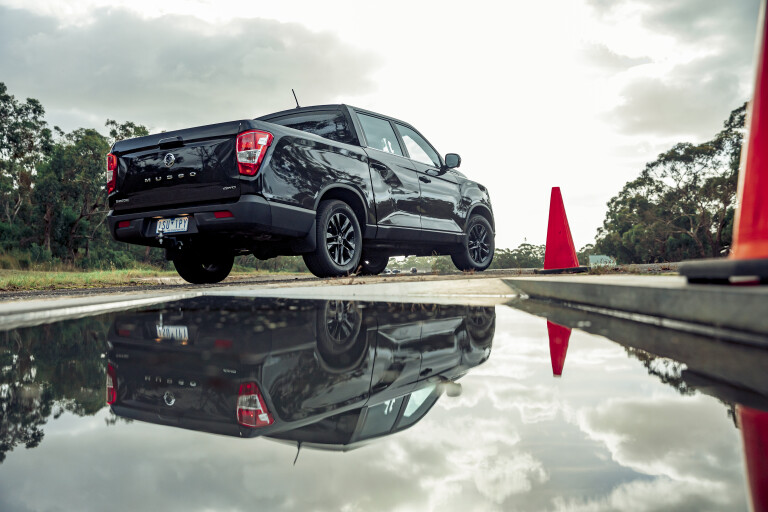
The GWM Ute – the naming meeting must’ve been a short one – packs even more in, including active cruise control, climate control and a 220-volt power outlet, though it lacks the Musso’s ventilated seats and a reach-adjustable steering wheel is weirdly limited to the top spec Cannon-X. Its cabin presents well, with a range of leather surfaces and metal-look inserts, while the seats are comfortable with plenty of bolstering.
The lack of steering wheel reach adjustment is an ergonomic demerit, as is the T-bar transmission selector that can make locating the right gear confusing, while the dead pedal sits unusually close and the wide centre console eats into legroom.
Visibility is hampered by thick A-pillars and the rear sports bar but the rear seat is relatively comfortable with good under-thigh support.
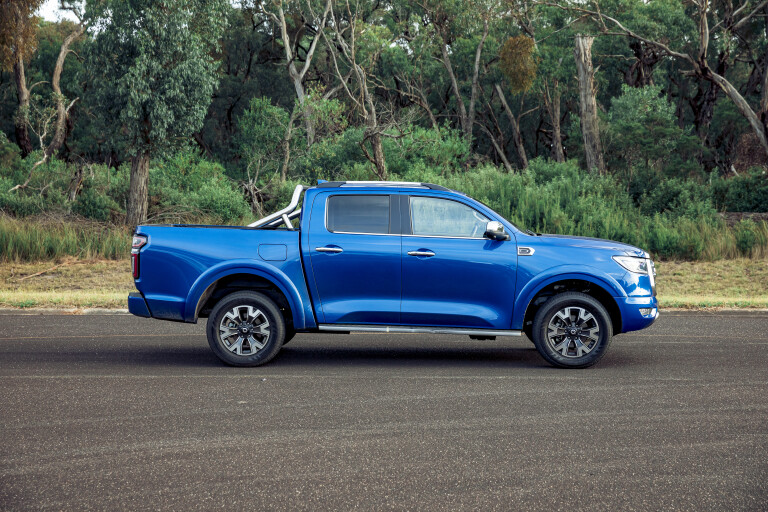
Swap into the Musso and it’s a similar story, though the fact the centre rear seat uses only a lap belt is unacceptable in a modern vehicle. Forward visibility is improved by the separation between the A-pillars and mirrors but the hard plastics littered throughout the cabin make the Ssangyong feel a generation old.
There’s no native sat-nav or digital radio but it’s pretty easy to switch to smartphone mirroring and the Bluetooth connects quickly. The GWM’s infotainment takes a while to launch after jumping into the car and its switchgear feels cheap to the touch, though that's not unexpected for the price! What’s slightly disconcerting is that some messages are still displayed in Chinese and others are misspelled, such as the system “Scaning…” for a device.
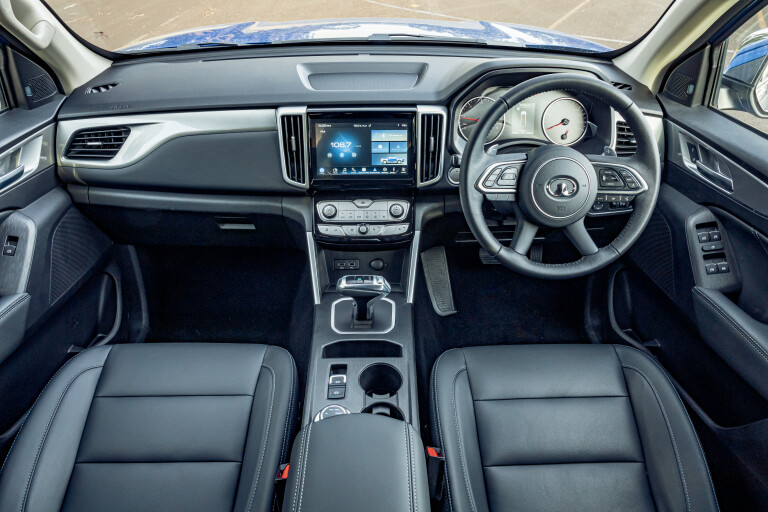
Both vehicles offer a seven-year/unlimited-kilometre warranty and the Ssangyong’s even covers commercial usage for the duration, which is impressive confidence in the product. GWM offers a five-year/100,000km roadside assistance program, available 24/7 nationwide, though Ssangyong bests that with a seven-year deal. It also has an advantage with its capped-price servicing program, which equates to $375 every 12 months/15,000km, whereas GWM has yet to establish such a program and servicing is required every 12 months/10,000km.
On the move, the GWM Ute feels like a big vehicle propelled by a small motor, which is exactly what it is. The 2.0-litre four-cylinder turbodiesel produces just 120kW and 400Nm, which isn’t much to motivate 2100kg of dual-cab. The smooth-shifting eight-speed auto makes the most of the available grunt but our recorded figures of 0-100km/h in 11.38sec and 60-100km/h in 6.7sec are adequate at best.
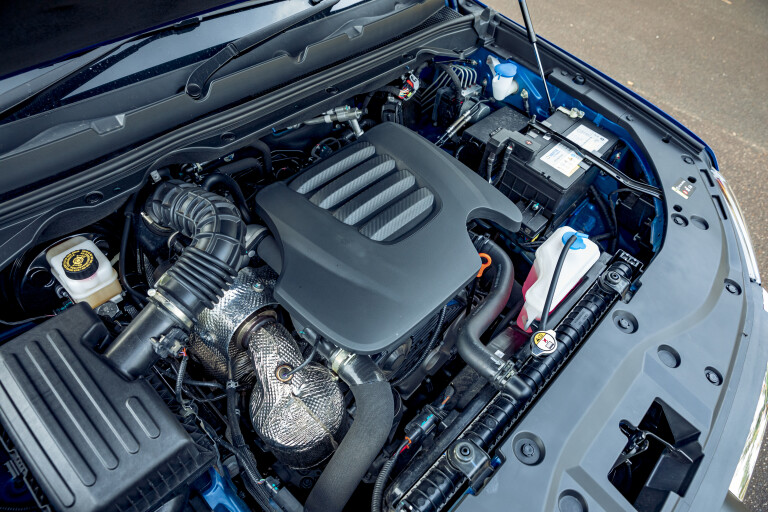
Adding a load doesn’t help matters, the Ute taking 4.5sec to accelerate from 20-60km/h with a 500kg pallet on board and the automatic’s shift mapping means it rarely holds the right gear on the move. On the plus side, the payload is a commendable 1005kg and the spraylined tub is a good size, while the tailgate has soft-open gas struts and a handy step ladder that folds out to assist access.
Both vehicles offer a seven-year/unlimited-kilometre warranty and the Ssangyong’s even covers commercial usage for the duration, which is impressive confidence in the product.
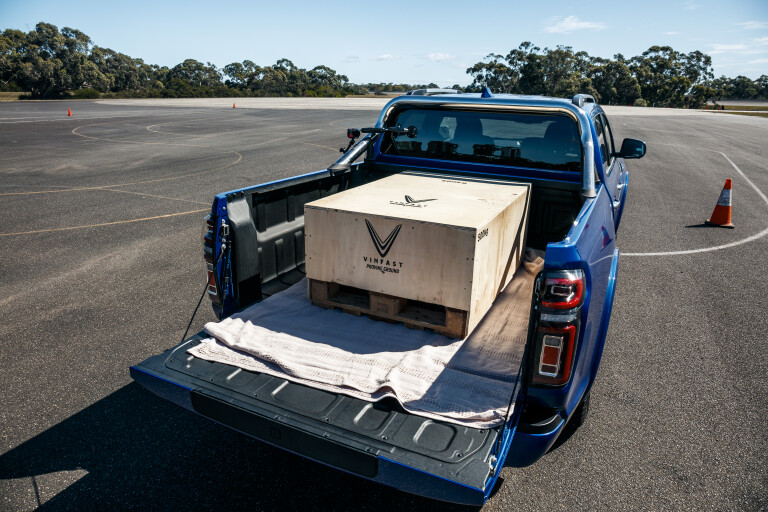
If it’s size you want, the Musso is the ute for you, the XLV variant adding a whopping 310mm to the tub’s length compared to standard variants. However, while it’s large, the payload is rated at just 880kg and that's a deceptive figure in itself as the 2170kg Musso’s 2980kg Gross Vehicle Mass offers just 810kg to be shared between passengers, towball download and cargo.
Laden acceleration is better than the GWM at 4.2sec from 20-60km/h thanks to the Musso’s extra grunt, its 2.2-litre four-cylinder turbodiesel producing 133kW and 420Nm. This doesn’t translate to unladen acceleration, the Ssangyong taking a leisurely 11.46sec to hit 100km/h and an identical 6.7sec from 60-100km/h.
The Cannon-L’s straight-line advantage is down to the more closely-stacked ratios of its eight-speed automatic, as the Musso’s engine feels stronger with a wider spread of available grunt.
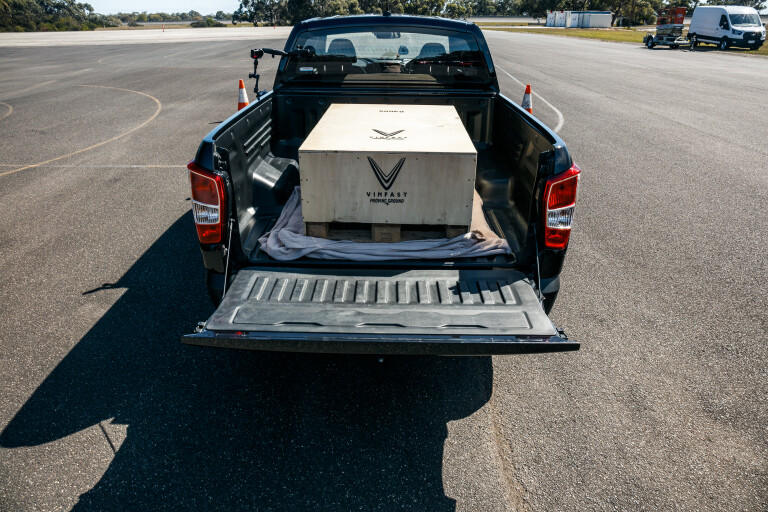
Its braking is a sub-standard 41.51m in the dry (anything over 40m isn’t ideal, even for a dual-cab) and 56.78m in the wet, though it’s better than the GWM’s, which is an alarming 43.37m in the dry and 58.65m in the wet.
We did intend to tow test these two, but the GWM arrived without a tow bar so it was a short-lived idea. Nevertheless, with Street Machine’s Turbo Taxi hooked up the Musso wasn’t particularly happy, its vocal engine struggling with the weight and accompanied by doughy brakes and soft suspension. The biggest issue, however, was a general lack of rigidity; on rougher roads the Musso's body jiggles substantially like it’s trying to separate from the chassis and adding weight to the back doesn’t improve matters.
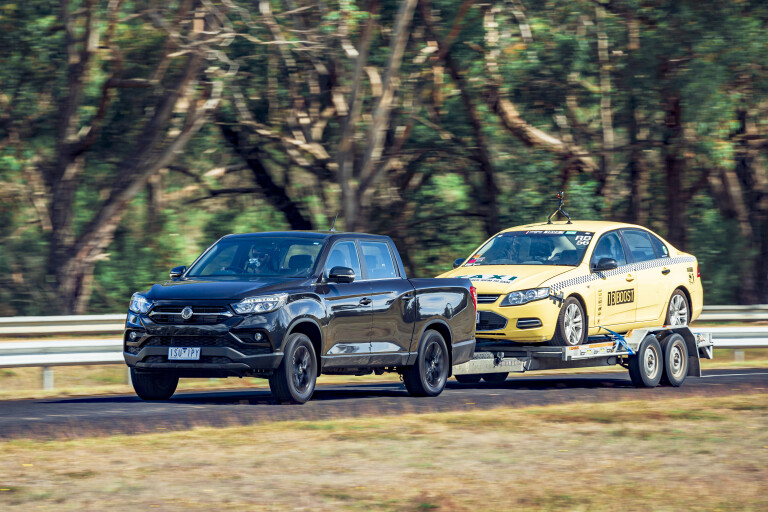
Unladen the Musso feels a little better, but only up to a certain (relatively low) point. Unexpectedly sharp steering conveys a sense of sportiness and the powertrain feels sprightly enough once on the move but there’s precious little communication through the steering wheel and the soft suspension leads to excessive body roll and generally skittish, nervous handling.
It’s superior to the GWM, though. There has to be a price to pay for the Ute’s cage-rattingly low price and it’s found in the driving experience. For starters, why is it so sluggish? On the road, the engine feels lazy and off-the-pace, with tardy acceleration and laggy throttle response.
The steering is light and responsive until a quick change of direction is required, at which point the power assistance fails to keep up and the wheel feels like it’s stuck in concrete. On rougher roads there is excessive and quease-inducing body shake as well as plenty of wind and tyre roar.

Its fortunes don’t improve off-road, either. The over-complicated gear lever was a particular annoyance in the rough stuff where quick shifts from drive to reverse and back are required. There are positives: the traction control system is reasonable and hill descent control worked well, especially in conjunction with the rear locking diff, but constant clunks and bangs from the rear end in tight cornering are a cause for concern.
Nevertheless, it acquits itself better than the Ssangyong, which struggles off-road primarily due to a lack of ground clearance. It bottoms out constantly, the automatic rear diff lock isn’t as practical as a manually selectable one, low-range gearing isn’t ideal and throttle response isn’t particularly smooth, either.
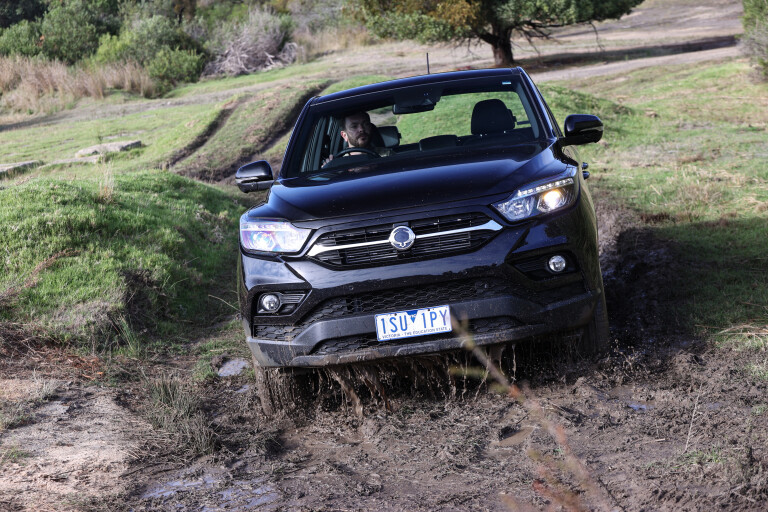
Let’s be clear that the GWM Ute is a massive, massive step forward from Great Wall’s previous offerings and is now on the cusp of competitiveness. It has plenty of showroom appeal thanks to modern exterior and interior styling, plenty of features and a strong warranty. However, from behind the wheel, the compromises inherent in the GWM’s eye-popping price quickly become clear; in terms of ride, refinement, performance and dynamics it still lags well behind even a base Triton that isn’t a million miles away in terms of price.
The Ssangyong performs better, on-road at least. If you need to carry big people or big stuff then the XLV offers heaps of metal for the money, but the standard-wheelbase Musso is perhaps a better bet for most, its lighter weight improving performance, ride and handling.
In reality, these two don’t compete with the established players in the new market but instead with second-hand examples. For example, $35,000 gets you a six- or seven-year-old Hilux or Ranger with almost 200,000km on the clock and while, to be honest, those vehicles are probably still objectively superior, there’s a lot to be said for a brand new car with up-to-date safety and technology as well as a seven-year warranty. If that describes your buying situation, grab the Ssangyong.
Verdict
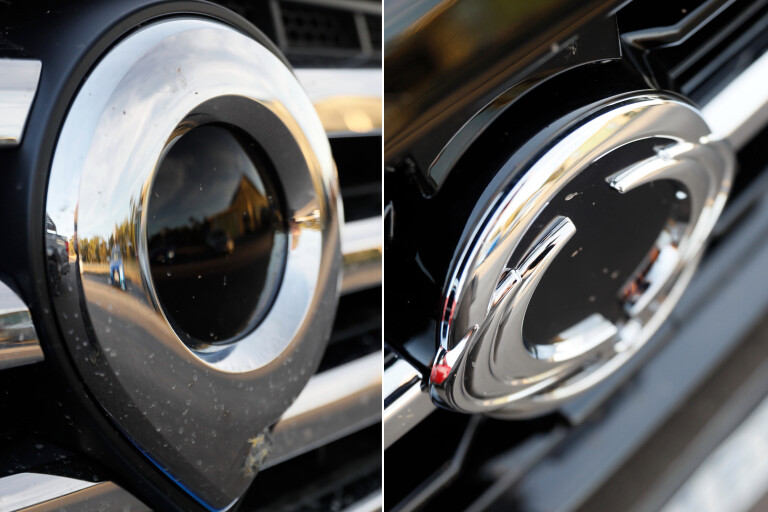
Ssangyong Musso Ultimate XLV – 1st
Likes: Heaps of space; solid if unspectacular performance; strong equipment list
Dislikes: Body rigidity; small payload; struggles off-road
Score: 6/10
GWM Ute Cannon-L – 2nd
Likes: Clever dual-cab touches; looks good inside and out; value
Dislikes: Underwhelming powertrain, dynamics and ride; lacks interior polish
Score: 5.5/10
SCORE BREAKDOWN
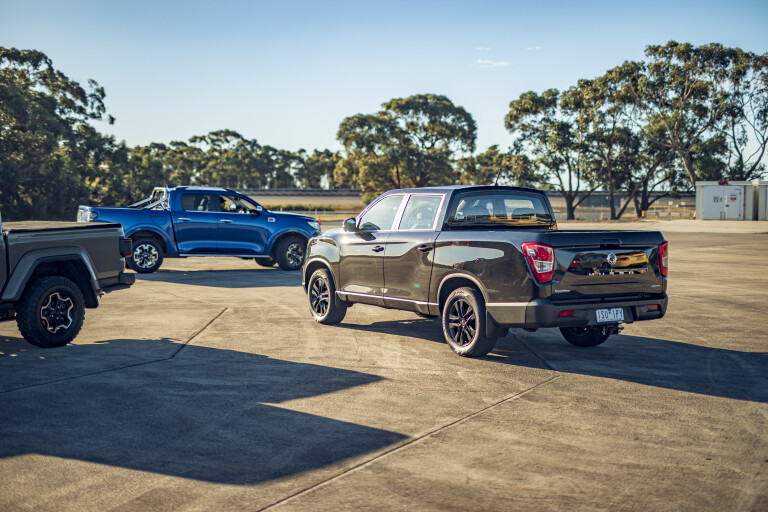

COMMENTS